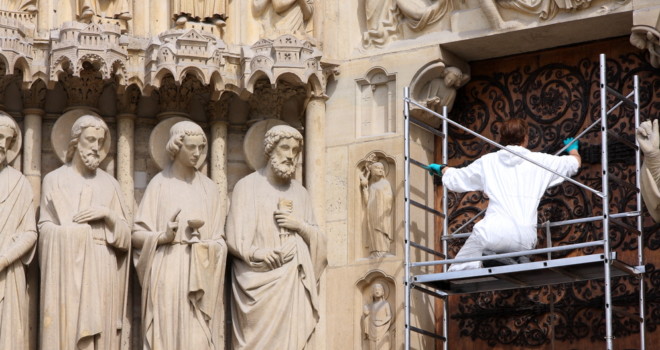In a well-organized life there are no “leftovers” in the sense of superfluous actions and superfluous time. Nothing can be wasted, nothing let go. We cannot pass over any opportunity through which the seed of grace and of salvation may increase in us.
Every man has a duty to be a good husbandman of his vineyard, and the good farmer sees to it that every plant bears fruit.
We cannot afford the sort of work that will not bear fruit a hundredfold. But hundredfold fruit is the fruit of grace, of holiness, and of the union of the soul with God. This is the whole economy of our life’s toil.
The toil of daily work is not hopeless. It can become the medicine of corrupted human nature. With the help of toil, we can struggle against the corruption brought about in us both by Original Sin and by our own sins.
Every sin makes the work of the mind and will more difficult; it destroys something of their efficiency. Work sets out to repair this loss of efficiency, and to obliterate the traces of sin. In all work we see the lines of this struggle: we try to conquer ourselves, to use violence on ourselves and on our slowness, lack of will, listlessness, and weakness. Man, when he is forced by work to break with selfishness, frees himself from the flaws and consequences of sin and prepares the terrain for virtues.
Work should ennoble the worker
We deduce from this that the toil of work can be ennobling: by itself it cannot degrade man. Only badly organized work, or injustice in the way it is regulated — the crushing burden of work beyond human endurance — can degrade man. It is then that the revolt of the world of work is born, the revolt of the workers, and the social revolt against the degradation of man in work.
As Pius XI said, this is a just revolt, that man might not emerge coarsened and vulgarized from the workshop where dead matter is being ennobled. Here there is an obvious abuse that cries to Heaven for vengeance, for it wrecks God’s saving plan in relation to work. If, however, a just measure is observed, then every sort of work can and ought to ennoble.
In every resistance we meet in work, we recognize man’s resistance to God. The effort with which man acts on matter and ennobles it is like God’s effort when He acts on man to ennoble him. God is continually correcting His work in us, wishing to stamp His image, the light of His countenance, on it. Similarly man leaves his mark on the object of his work. From the work we recognize the master. However, in this action of man on matter, we come up against the resistance of matter, which is like the resistance of man to God.
Matter yields in the end, however, to the human mind and will, and this surrender should serve to encourage the surrender of man to God. As clay yields to the potter, so man yields to God; as the hardest rock yields to the sculptor who deals it good, painful blows, yet ennobles it, giving it beauty of form — the stamp of his genius — so man, however much tried by God, once he has yielded to Him, emerges from every trial more similar to the image of God.
The example of liberated matter inclines us toward this surrender to God, for we see how matter immediately runs wild whenever it escapes from the guiding human hand. We see how blind nature avenges itself on the civilization that ennobles it and on human work, burying it in the ruin of prehistory. Krasinski saw in the Roman Forum, protruding from mountains of rubbish and ruins, the capitals of what had once been the columns of glorious temples. How great a desolation the freedom of blind strength can bring about! In Crete the remains of wonderful cities have been dug up — traces of a prehistoric Aegean civilization that may have been richer than the Greek or Roman. And it all lies in ruins.
We are witnesses of the struggle with the rock in the quarries, with the stony soil, with the bare crags. We see the onrush of the desert overwhelming human settlements as soon as irrigation is neglected. The raging flood mocks human barriers. All of this cries out to man, “I will not serve” (Jer. 2:20). And yet it does serve.
When man begins to serve God, when he himself is frightened by the terrifying picture of the ruin wrought in the soul by revolt, he comes to hate this desolation. In the ruins of creation man sees the image of the havoc created in the soul that has rebelled. Today, when bombed towns lie shattered in ruins, it is obvious that this is the work of hate and not of virtue and labor. Man comes to his senses. “I will arise and go to my father” (Luke 15:18). Here is one more motive that should encourage us to ennoble our souls by work.
And what else? Work, by its difficulty, redeems, liberates, ennobles, and sanctifies.
Work wears away our physical strength and uses up some of its reserves. In this way it frees our spirit from the domination of matter and of the body. Man becomes the borderline between the earthly world and the heavenly. Work only develops the physical and spiritual skills of man to certain limits: when they are developed to the peak of their possibilities, they begin to give out. A lifetime of work leaves its mark on us. Hard work frees us gradually from the body and its powers; by tiring the body, it calms it down and makes it easier for us to exercise control over it.
What is more, by wearisome work man repays to God the debts incurred by sin. How often we forget this! If the labor of work is accepted with love, this work of redemption by toil will bring us to the gates of merit. For work must be carried out not only for temporal good, but for eternal. Work comprises not only the task of life on earth, but also the task of eternal life.
“By the sweat of thy brow shalt thou eat bread until thou return to the earth, out of which thou wast taken,” until the very instant that the union of Heaven and earth takes place.
And so work is not merely the fulfillment of our vow of obedience or of our profession, nor is it merely the voice of duty or of the needs of our stomach. The whole hardship of work is disproportionately great in comparison with these aims. The sweat of a man’s toil-stained face marks a suffering that purifies not so much the body as the soul. In this suffering is the whole Calvary of man, who dies every day on the cross of his life in order to destroy death by this slow death-agony, and so to attain the glory of resurrection. Man, bathed in sweat, knows that there is no earthly reward, no wages or recompense, that could ever pay him enough for this sacrifice. The hard workers can always ask, “How is a man the better for it, if he gains the whole world at the expense of losing his soul?” (Matt. 16:26; Luke 9:25). What would come of the most productive, tiring work by miners in the earth, or by workers in factories, slaving away in constant terror of bombs; what would come of all this work, if it did not contain in itself a task for eternal life? When, in the suffering work entails, we see these tasks of eternity, this pledge of the soul’s ransom, a change comes over even the weariest.
For it is in such toil that we discover the value of suffering. The toil of work for us will be this everyday, familiar cross: suffering toward which we hasten, suffering that is not, indeed, as sublime as that which hagiography describes but which is no less real, precious, and full of merit.
For in such toil we discover the value of patience. We know that we are not struggling only for the temporal perfection of our work, or for mere profit or gain, but for eternal perfection, for the eternal fruits of ordinary, everyday work.
For in such toil we discover satisfaction for our faults, from which no child of earth is free. Toil, accepted in a proper spirit, is for us an anticipation of Purgatory. It is possible for us here below to sweat the stains of sin, our whole responsibility for our faults, out of our system by means of work, and to give them back to the earth from which we took our sins. This is the extraordinary dispensation of time.
Work is an instrument of salvation
It can be seen from this that work is not the curse of man and that toil is not humiliating, for it contains hope. The sweat of one’s brow and the labor of one’s hands do not debase; they raise up and exalt. Work becomes an instrument, one of the means of salvation. The toil of work is linked with the joy of victory over matter and over oneself. It is therefore a double joy. To the natural joy of a new task completed there is added a supernatural joy that the work is, in every respect, well done, since it brings us even further on our road to eternal life.
The sight of a man hard at work is full of consolation. We say to ourselves, “By the sweat of his brow our brother is saving his soul.” Let us yearn to support him, to lift up his cross with the arms of the Cyrenian (cf. Mark 15:21). The act of salvation is taking place. Let us hasten with help, that the yield may be a hundredfold. These are the most important thoughts bearing on the problem of the redemptive toil of human work.
A few conclusions arise out of this. It is under the excessive burden of work, surpassing human endurance, that man most often breaks down. But even if this excessive toil produced no other fruit than the feeling of our weakness, our lack of skill and strength, it would still not be wasted. If in excessive work we recognize our helplessness, and from it learn humility in relation to God and full dependence on Him, it is already much!
In view of the truth that toil is satisfaction for our faults, we have a duty to offer our suffering and sweat to God. Not only is work laid down by God, but the very hardship it involves has its allotted task. We must guide it, therefore, toward its redemptive destiny.
We must also offer God the work of those who in their labor think neither of Him nor of the supernatural value of work. Let us glance around at the people working near us. Which of them ever thinks that his work is satisfaction for sin? We must make good their failure to offer it.
And we must also offer God the pain and labor of those who curse the work appointed by God, who rail at both the work and God. And there are many like that: not merely individuals, but whole doctrines, whole systems of thought. They curse God and Adam because man wears himself out at work, for they cannot distinguish God’s intention from bad human arrangements. Who will take up the toil that they have wasted?
In addition there is the whole multitude of people who make instruments of sin for themselves out of the blessed fruit of hard work, so that, instead of worship resulting from their toil, an insult is offered to God. Here is the opportunity for beautiful, lofty apostolic work! Christ wants us to place the whole burden of our work on His Cross, to become co-sufferers with Him. The hardship of work is our daily cross. “If anyone wishes to come after me, let him deny himself, and take up his cross, and follow me” (Matt. 16:24; Mark 8:34; Luke 9:23).
Let us ask ourselves now whether the toil of work is a curse or a punishment, or whether it is yet another lifeline, an opportunity of increasing redemptive grace in oneself? Should we then want work that has been made too easy, comfortable work, work that has been completely purged of all hardship? Would the result not be that that which spared a part of man ended by impoverishing the whole man? We will obtain full redemption only from Christ: “Come to me all you who labor and are burdened; I will give you rest” (Matt. 11:28).
Editor’s note: This article is from a chapter in Sanctify Your Daily Life, available from Sophia Institute Press.










